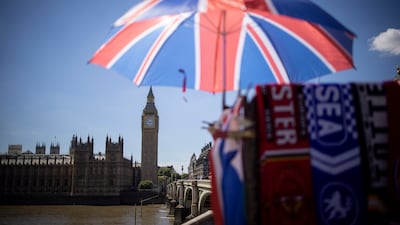The next British prime minister is being chosen right now. While there has been a televised debate between the candidates, I didn’t watch. It is not because of lack of interest, but because, like 68 million other British people, it doesn’t matter what I think. We’ll find out the identity of the new prime minister by September but whoever they are, they’re not being chosen by me, or you, or anyone you know – unless you or your friends happen to be Conservative party members. And that’s a peculiar group of people.
The Conservative party claims 200,000 members. But academic researchers suggest the true figure is 160,000, just 0.3 per cent of the UK electorate. According to a team from Queen Mary and Sussex universities, led by professor Tim Bale, two thirds (63 per cent) of Conservative party members are male, almost all are white (97 per cent), most are over the age of 50 (58 per cent) and considerably richer than most British people. Only 6 per cent are under 24 years old. These Conservatives are not very geographically, socially or racially diverse. Most (56 per cent) live in London and south-east England, while 80 per cent belong to the highest social economic groups known as ABC1. Three quarters (76 per cent) backed leaving the EU in 2016. Opinion polls now show a majority of Britons think that Brexit was a mistake.
And yet, whomever these Conservative members choose as their new party leader will become the prime minister of the other 68 million of us, whether we like it or not. It’s true there will eventually have to be a general election in which we can all vote, but that does not need to happen for more than two years, until December 2024.
All this points to the peculiarities of Britain’s famously unwritten constitution. This constitution is often complacently assumed to be wonderfully democratic, but some of its traditions seem archaic and unsuitable in a modern 21st-century democracy.
To take one obvious example, when an American president dies in office, as when John F Kennedy was assassinated in 1963, the vice president, in that case Lyndon B Johnson, became president within hours. But in the UK, there is no obvious successor to a prime minister who, like Boris Johnson, is forced out as a result of his own party members eventually becoming repelled by his lying and other activities.

It is true that Mr Johnson has, in theory, a deputy prime minister, Dominic Raab. But despite the title, and the fact that Mr Johnson has said he is resigning, Mr Raab has not taken over as caretaker, nor is Mr Raab even a candidate in the race to succeed Mr Johnson. Nor does a deputy prime minister have any specific powers. In fact, even having a “deputy prime minister” is a recent invention.
During the Second World War, in 1942, then prime minister Winston Churchill acknowledged the enormous cross-party co-operation he received from the then Labour leader, Clement Attlee, by inventing the deputy leader title, but this did not give Attlee any additional powers. In the past 80 years, a variety of politicians have been called deputy prime minister but none of those officially designated as deputy went on to get the top job.

This is, as with many constitutional matters, just a very peculiar British tradition. Yet, it is important now because Mr Johnson has always been a rule breaker. He did not obey the unwritten norms of behaviour in British public life. Indeed for some voters, and certainly for some Conservative party members, this cavalier rule-breaking attitude was part of the reason they wanted him as leader in the first place. And it is more or less the same electorate – those 160,000 older, whiter, richer mostly male Conservative party members – who voted in Mr Johnson overwhelmingly in 2019, and who in 2022 are about to choose his successor, despite the fact that this same group have given the country a series of failures.
Three British prime ministers have been forced to resign in just six years – David Cameron in 2016, Theresa May in 2019 and Mr Johnson in 2022. Perhaps this time they will get lucky and the Conservatives will find a leader who can stay in office for a full parliamentary term without being forced to quit. Certainly, Conservatives can be ruthless, pragmatically changing leaders and also policies very rapidly if they become unpopular.
The much hated “poll tax” introduced by Margaret Thatcher in England and Wales in 1990 marked the end of her political career. The tax was scrapped. Brexit destroyed both Mr Cameron and Ms May. But now no one can say with any confidence who will be the next Conservative party leader by September. Nor can anyone forecast how divided the party will be by the contest. What can be predicted is that economic problems, trade problems, and industrial discontent demand a degree of competence, hard work and practical policies that have been lacking in post-Brexit Boris Johnson Britain. Being prime minister is never easy. Right now it is especially difficult.


